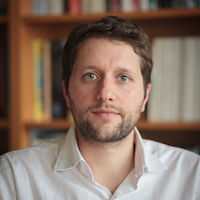In the same section
Professor

frederic.louault@ulb.be
+32 (0) 2 650 67 74

ULB - Campus du Solbosch
Avenue F.D. Roosevelt, 50 - CP 124
1050 Bruxelles
Adresse visiteur :
Bâtiment S, 11è étage - Bureau : S11.226
Avenue Jeanne, 44
1050 Bruxelles
Bio
Frédéric Louault holds a PhD in political science (Sciences Po, CERI) and has been Professor of Political Science at the Université libre de Bruxelles since 2012. His research focuses on democracy, elections and different forms of political participation in Latin America. He’s studying electoral processes combining qualitative (interviews, observations) and quantitative (surveys) approaches. Between 2022 and 2024, he led a research project entitled “The Pastor and the Voter”, funded by the FNRS, which assessed the electoral influence of evangelical churches in Latin America. He is also interested in unconventional vectors of politicization: sport, music and other artistic practices, etc.
Before joining ULB, Frédéric Louault worked for Sciences Po Paris, the Institut d'Etudes Politiques de Grenoble and the Institut des Hautes Etudes de l'Amérique latine (IHEAL - Sorbonne Nouvelle). He’s teaching Political sociology, Political science research methods, and Comparative politics. He also teaches specialized courses on Latin American politics and society.
At the Université libre de Bruxelles, Frédéric Louault was director of the Centre d'étude de la vie politique (Cevipol) between 2020 and 2024. He is currently co-director of the Maison des Sciences Humaines (MSH), within which he coordinates the Centre interdisciplinaire d'étude des Amériques (AmericaS). Visiting professor at several universities (in Argentina, Brazil, Colombia, Spain, France), he is also vice-president of the Observatoire Politique de l'Amérique latine et des Caraïbes de Sciences Po Paris (OPALC - Sciences Po).
Working languages: French, Spanish, Portuguese, English
CV
Main positions held at ULB:
- Co-director of the Maison des Sciences Humaines (MSH) (since 2024)
- Director of Cevipol (2020-2024)
- Deputy Director of CEVIPOL (2018 - 2020)
- Co-director of the Center for the Study of the Americas (AmericaS), Maison de Sciences Humaines (since 2017)
- Vice-dean of the ULB Faculty of Philosophy and Social Sciences, in charge of International Relations (2017-2019)
- President of the ULB Latin America Working Group (since 2016)
Areas of research
- Elections and electoral behavior
- Political participation & Social movements
- Democracy / Authoritarianism
- Politicization and political legitimacy
- Latin America / South America
- Teaching
-
Courses taught at ULB (in French)
Political sociology (Bachelor)Advanced Political Science Studies / Research Methods in Political Science (Master)
Latin American Politics (Master)
Brazilian Politics and Society (Master) - Research
-
My research is mainly devoted to the study of electoral processes, democracy and different forms of political participation in Latin America. My doctoral thesis, entitled “Electoral defeats. The case of the Workers' Party in Rio Grande do Sul, Brazil (1982-2008)”, analyzed the consolidation of Brazilian democracy from the perspective of electoral alternations and, more specifically, the acceptance of defeats by losers. It also explored the representations of electoral defeat by political staff, as well as the concrete implications in terms of political careers (militant commitment, professional bifurcations, etc.). Following on from this thesis, I devoted a large part of my research to the study of political participation and the relationship between elections and democracy in Latin America.
The study of political participation in Latin America - in both its conventional and unconventional forms - has figured prominently in the research I've carried out and directed in recent years. In particular, I led a “G3 Fapesp” project (2016-2018), with the universities of Geneva (Unige), Montreal (UdM) and Campinas (Unicamp), on the theme of “Institutional participation and activism in Brazil”. This project analyzed the effects of participation in democratic innovations on the trajectories of citizens.
I also worked on unconventional modalities of political participation in Latin American political regimes: the politicization of sporting events (notably the 2018 Football World Cup in Brazil); the emergence of social movements in contexts of political polarization; protest movements against electoral fraud.
As regards the relationship between elections and democracy, I have taken part in several comparative studies of electoral analysis applied to America and published regularly in CERI's Etudes. In particular, we have examined changes in voter turnout, the conditions of electoral alternation, the articulation between different levels of power and the logic of intermediate elections.
Finally, I was involved in a research project led by OPALC - Sciences Po on the 2017-2019 electoral cycle in Latin America. Based on a comparative study of sixteen national cases, we explored the conditions of electoral alternations and assessed the extent of the region's conservative turn. Empirical surveys carried out in the various countries enabled us to assess the disaffection with politics (crisis of the electoral offer), dysfunctional electoral behavior (desertion, delegation, protest) and the rise of populist outsiders. I organized and directed the electoral survey carried out during the 2018 and 2022 elections in Brazil. We analyzed electoral volatility and explanatory factors for voting in working-class neighborhoods in São Paulo and Rio de Janeiro.
My latest research focused on the articulation between the religious factor - in particular evangelical churches - and the affirmation of a neo-conservative vote in Latin America in the 21st century, as part of the MIS-FNRS project entitled “Le pasteur et l'électeur. The electoral influence of evangelical churches in Latin America” (2021-2024). This research combined top-down (interactions between electoral campaign teams and religious elites) and bottom-up (religious socializations in working-class neighborhoods) approaches. Our team combined qualitative and quantitative tools, with a comparative perspective (Argentina, Brazil, Colombia, Costa Rica). - Publications
-
Last books published
- Louault Frédéric, Parthenay Kevin (dir.), Politique de l’Amérique latine, Bruxelles, Larcier, Collection “Traités”, 2023
- Louault Frédéric, Le Brésil. L’interminable émergence, Paris, Tallandier, 2022
- Louault Frédéric, De Barros Margaux, Kermoal Kevin (dir.), Marges et marginalités au Brésil. Espaces, pouvoir et société, Bruxelles, Presses de l’Université de Bruxelles, 2022.
- Dabène Olivier, Louault Frédéric, Atlas de l’Amérique latine. Croissance, la fin d’un cycle, 6e édition, Paris : Autrement, 2022.
